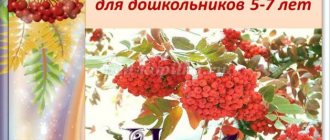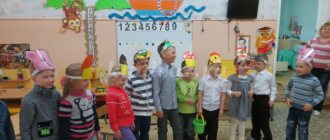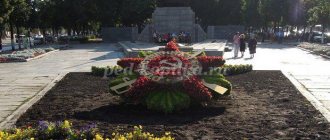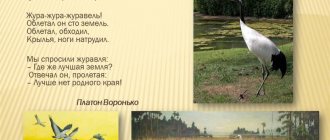Calendar and thematic planning in the preparatory school group “Etiquette”
Larisa Amelchenko
Calendar and thematic planning in the preparatory school group “Etiquette”
Planning of educational work for January from 01/25/2021 to 01/29/2021
Group : preparatory to school . Topic of the week: Etiquette
Goal: Techniques for improving cultural and hygienic skills (dressing, undressing, washing, etc.)
.Development of strong-willed qualities: the ability to limit one’s desires, obey the requirements of the teacher and fulfill established standards of behavior, and follow a positive example in one’s actions. Formation of responsibility for fulfilling work assignments.
Final event and date: Musical and literary entertainment “Music and Poetry”
(01/28/2021)
. Responsible: Amelchenko L.I.
Day Mode Integration of OO Joint activities of adults and children, taking into account the integration of OO Independent activity of children Organization of PRS
Group , subgroup Individual OD in special moments
Monday
January 25 Social and communicative morning;
educational;
artistic and aesthetic; physical development. Morning exercises. Game situation “Knights and ladies”
.
Listening to “Stubborn Man”
by G. Sviridov.
Consideration of schemes for the correct use of cutlery. Decorating the etiquette . Develop the ability to compose a story from personal experience (Milana, Kirill)
.
Emphasize the importance of observing etiquette . Poster "Tree of Goodness"
.
Illustrations “How to behave and how not to
. Encourage and encourage compliance with ethical standards in all types of independent activities.
GCD Cognitive, artistic and aesthetic development Cognitive development (FEMP)
.
Lesson 35 (January)
. Objectives: Learn to compose and solve arithmetic problems on addition and subtraction;
introduce the clock and set the time on the clock layout; improve the ability to navigate on a sheet of squared paper. I. A. Pomoraeva. Formation of elementary mathematical concepts: Methodological manual for classes with children 6 - 7 years old (p. 112)
.
Artistic and aesthetic development (sculpting)
.
Lesson 53 (January)
.
(turkey)
in sculpting : an oval body, a curved tail with wavy edges, etc. Practice sculpting the basic shape from a whole piece using previously learned sculpting techniques.
Develop aesthetic perception. T. S. Komarova. Visual activities in kindergarten. Preparatory group for school (p. 75)
.
Physical development (hall)
.
Lesson 19 (January)
. Objectives: Exercise walking and running with an additional task
(stepping over cords)
;
develop dexterity and eye in exercises with the ball; repeat climbing under the cord. L. I. Penzulaeva. Physical education in kindergarten. Preparatory group for school (p. 54)
.
Walk Physical, cognitive, speech development Observation of the behavior of children of other groups : whether they act correctly or incorrectly. Labor activity: raking snow to the trunks of trees and bushes. Musical and rhythmic movements “Change a pair”
.
Sledging. D/i "Business Communication"
.
S/r game "Home"
.
Learn to maintain balance when walking on a limited surface (Makar, Alevtina)
. Accustom to neatness and neatness. Shovels, buckets, molds, diagrams of snow castles. Encourage the desire to accept the point of view of another person, to look at oneself from the outside, while choosing an acceptable line of behavior from the point of view of ethical standards.
Return from a walk, KGN, lunch, work before bed, social-communicative, cognitive, speech development Reading the Nanai fairy tale “Ayoga”
.
Finger gymnastics “On the Christmas tree”
.
Help you remember the rules of table setting. Album "Knights and Princesses"
.
Social and communicative evening;
educational;
speech;
artistic and aesthetic; physical development. Awakening gymnastics. Problem situation “Careless performance of self-care work activities leads to bad consequences.” Singing “The children of the whole earth are friends”
.
S/r game "Shop"
.
Design “Tree of Goodness”
.
Strengthen the ability to say your last name and first name; surname, first name and patronymic of parents; home address and telephone number (Radik, Leonid)
.
Introduce the concepts of good nature and friendliness. Cards “Table Setting Rules”
. Create conditions for outdoor games and play exercises with aids and attributes of a physical education corner.
Walk Cognitive, physical development Observation: “Excursion around the territory of the kindergarten”
.
Relay game "Hockey Players"
.
D/i “Ask politely
.
Learn to slide on ice paths (Stepan, Maxim)
.
Learn to choose the right formula, taking into account the communication situation (with whom, when, why to talk)
.
Attributes for the s/r game “Home”
. Encourage and encourage compliance with ethical standards in all types of independent activities.
Day Mode Integration of OO Joint activities of adults and children, taking into account the integration of OO Independent activity of children Organization of PRS
Group , subgroup Individual OD in special moments
Tuesday
January 26 Social and communicative morning;
educational;
artistic and aesthetic; physical development. Morning exercises. Introduce napkin rings and show some techniques for beautifully folding linen napkins. Review of the album “Museums of Magnitogorsk”
.
Conversation “Rules of behavior in the library”
.
Reading V. Oseev “The Magic Word”
.
Learn to compose a story according to a scheme on behalf of the literary hero “I have quite a few friends” (Dasha V., Aina)
.
Learn to take into account the opinions and interests of others. Album "Knight's Castles"
. Learn to follow the rules of behavior during the game.
GCD Speech, physical development Cognitive development (FCCM - human world)
.
Lesson 10 (January)
.
Library. Tasks: To give children an idea of the library, of the rules that are adopted for readers visiting the library. Cultivate a caring attitude towards books. O. V. Dybina. Familiarization with the subject and social environment. Preparatory group for school (p. 43)
.
Artistic and aesthetic development (drawing)
.
Lesson 35 (December)
.
How we dance in a music lesson. Objectives: To teach children to convey in drawing the differences in the clothes of girls and boys, the movements of the figures. Continue to develop the ability to draw the contours of figures with a simple pencil and beautifully paint over images. T. S. Komarova. Visual activities in kindergarten. Preparatory group for school (p. 64)
.
Artistic and aesthetic development (music)
.
According to plan .
Walk Physical, cognitive, speech development Observation of winter phenomena in nature. Labor activity: feeding birds. Sports game "Bandy Hockey"
.
P/i "Tag on a sled"
.
D/i “Kind words”
.
Conversation “Speech
etiquette ” .
Learn to throw at a vertical target (Sasha, Masha)
.
Learn forms of expressing requests. Attributes for the s/r game “Shop”
. To develop the skill of safe behavior in outdoor games.
Return from a walk, KGN, lunch, work before bed, social-communicative, cognitive, speech development Reading Y. Akim “Greedy”
.
Finger gymnastics “Herringbone”
.
Expand and clarify children’s understanding of the rules of safe and ethical behavior in public places. Illustrations “What is charity”
.
Social and communicative evening;
cognitive development;
speech;
artistic and aesthetic; physical development. Awakening gymnastics. Construction from Lego "Knight's Castle"
.
S/r game "Barbershop"
.
Review of the album “Theatres of Magnitogorsk”
.
Drawing “My favorite performance”
.
Improve the ability to examine objects, their various properties, use different senses, talk about your impressions (Eldar, Dasha B.)
.
Situational conversation about compliance with ethical standards. Album "The History of Money"
.
Foster independence in organizing familiar games with a small group of peers .
Walk Cognitive, physical development Observation of the weather. P/i with the ball “Close - far, low - high”
.
Game situation “Who is my friend”
.
Practice sledding down a mountain (Bogdan, Artem)
.
Develop the ability to give thanks. Attributes for the s/r game "Garage"
. Help increase children's independent motor activity.
Day Mode Integration of OO Joint activities of adults and children, taking into account the integration of OO Independent activity of children Organization of PRS
Group , subgroup Individual OD in special moments
Wednesday
January 27 Social and communicative morning;
educational;
artistic and aesthetic; physical development.
Morning exercises. Conversation “Money and its history”
.
Reading S. Marshak “If you are polite
.
D/i “Let’s set the table: setting the festive and daily table
.
Game situation “Old Grandma”
.
D/i “Who, what, from what and with what?” (Eldar, Dasha B.)
.
Game problem situation “What the white towel will tell us about
.
Cards “How to sew buttons”
. Form sociocultural competencies.
GCD Cognitive, artistic and aesthetic development Cognitive development (FEMP)
.
Lesson 36 (January)
. Objectives: Continue to learn how to compose and solve arithmetic problems involving addition and subtraction.
Improve your understanding of the sequence of numbers within 20, the ability to divide a whole into 8 equal parts and compare the whole and its parts, the ability to determine the location of objects relative to each other. I. A. Pomoraeva. Formation of elementary mathematical concepts: Methodological manual for classes with children 6 - 7 years old (p. 60)
.
Artistic and aesthetic development (music)
.
According to plan .
Walk Physical, cognitive, speech development Observation: the structure of snowflakes. Labor activity: clearing the area of snow. P/i “Empty space”
,
"Replace the item"
.
S/r game "Garage"
.
Game situation “On the bridge”
.
Learn to change direction when going down a mountain on a sled (Nelly, Nastya)
.
Learn to notice and independently eliminate disorder in your appearance. Attributes for the s/r game “Family”
. To form sociocultural competencies in children: possession of knowledge and experience in fulfilling typical social roles.
Returning from a walk, CGN, lunch, work before bed, social-communicative, cognitive, speech development Reading V. Mayakovsky “What is good and what is bad”
.
Finger gymnastics
.
” Learn proper table manners. Illustrations “Elegant dresses and suits”
.
Social and communicative evening;
educational;
speech;
artistic and aesthetic; physical development. Awakening gymnastics. Conversation “Charity – what is it?”
.
Reading by I. Pivovarov “If the donkey would be very polite
.
Examination of drawings about the culture of behavior. D/i “How you can behave and how you can’t
.
D/i “Riddles”
- teach how to create riddles based on a description given by the teacher of properties, characteristic actions or key features of an object;
use figurative expressions, comparisons (Stepan, Nelly)
.
Learn to maintain proper posture at the table. Attributes for the s/r game “Barbershop”
. Learn to follow the rules of the game.
Walk Cognitive, physical development Observation of the work of a janitor. Skiing. D/i "Compliment"
.
Learn to lift a pre-positioned object while sledding down a hill (Dasha B., Eldar)
.
Intensify the words of greeting, gratitude, request, and farewell in children’s speech. Attributes for the s/r game “Chauffeurs”
. Teach yourself how to assign roles using a rhyme.
Day Mode Integration of OO Joint activities of adults and children, taking into account the integration of OO Independent activity of children Organization of PRS
Group , subgroup Individual OD in special moments
Thursday
January 28 Social and communicative morning;
educational;
artistic and aesthetic; physical development. Morning exercises. D/i "Hospitality"
,
"Knights and Ladies"
.
Competition of proverbs and sayings about etiquette . Compiling a collective story “It’s interesting for me with my friends
.
Exercise children in composing riddles about objects and phenomena, selecting definitions of the essential features of these objects and phenomena (Adelia, Roman)
. Reinforce knowledge of the safe use of cutlery. Schemes for the correct use of cutlery. Offer to come up with your own tasks for the game.
GCD Physical, artistic and aesthetic development Speech development ( preparation for learning to read and write )
.
Lesson 5 (January)
.
Vocabulary games and exercises. Objectives: Activate children's vocabulary. V. V. Gerbova. Speech development in kindergarten. Preparatory group for school (p. 56)
. Sounds d, d, letter D. Tasks: identifying a given consonant sound at the beginning and in the middle of words, from a stream of words, from a text; distinguishing sounds d-d; reproduction and reading of words with three sounds; reading 3-word sentences, analyzing sentences.
Physical development (street)
.
Lesson 21 (January)
. Tasks: Exercise children in walking between snowballs;
learn how to dribble the puck with a stick from one side of the ice to the other; repeat each other's sledding. L. I. Penzulaeva. Physical education in kindergarten. Preparatory group for school (p. 56)
.
Development of cognitive and research activities. Lesson 20. What are seeds for? Objectives: To form an idea of seeds, their diversity and purpose. To develop knowledge about the conditions of seed germination. Arouse interest in research activities.
Walk Physical, cognitive, speech development Observation: air temperature and snow condition. P/i "Tag on a sled"
.
Sliding along icy paths. Labor activity: shoveling snow towards tree trunks. D/i “Journey for a polite word”
,
“The best acquaintance”
.
Practice throwing the puck at the goal from a standstill and after dribbling (Maxim, Masha)
.
Strengthen the habit of putting toys away in a designated place. Attributes for the relay game “Hockey Players”
. Learn to act as judges and evaluate the compliance of players’ actions with the rules of the game.
Return from a walk, CGN, lunch, work before bed, social-communicative, cognitive, speech development Reading N. Nosov “On the Hill”
.
Finger gymnastics “New Year”
. Situational conversation about rational nutrition. Illustrations and books on the topic.
Social and communicative evening;
educational;
speech;
artistic and aesthetic; physical development. Awakening gymnastics. Workshop “Learning to sew buttons to clothes”
.
S/r game "Library"
.
D/i “I don’t like it when...”
,
“Bad mood”
.
D/i “Name the sound”
- learn to name the sound that the word begins with
(Milana, Kirill)
.
Game situation “Clean Plate Society”
.
Game situation “Clean Plate Society”
.
Photo album “Museums of Magnitogorsk”
. Expand children's understanding and enrich their gaming experience.
Walk Cognitive, physical development Observation of the dog. P/i “Empty space”
.
D/i “How to find friends”
.
To improve the ability in the game of bandy to perform a throw at the goal, acting only with the hand, and throws with a wide swing (Sasha, Stepan)
.
Form gender, family, civic affiliation. Attributes for the s/r game “Kindergarten”
. Learn to convey the content of game roles in a new way.
Day Mode Integration of OO Joint activities of adults and children, taking into account the integration of OO Independent activity of children Organization of PRS
Group , subgroup Individual OD in special moments
Friday
January 29 Social and communicative morning;
educational;
artistic and aesthetic; physical development. Morning exercises. Listening to "The Jumper"
G. Sviridova.
D/i "Ladies and gentlemen"
.
Conversation “I have become big”
.
Practice combining good feelings for loved ones with kind words that are customary to say before parting. D/i “Make a figure”
-
“Columb’s egg” (Alevtina, Aina)
.
Situational conversation “Behavior at the table”
.
Album "Theatres of Magnitogorsk"
. Develop the emotional sphere and play activities.
GCD Speech, physical development Physical development (swimming pool)
.
According to the plan of the swimming instructor
Speech development. Lesson 6 (January)
.
Reading the fairy tale by S. Marshak “Twelve Months”
. Tasks: Introduce children to the fairy tale by S. Marshak
“Twelve Months”
.
V. V. Gerbova. Speech development in kindergarten. Preparatory group for school (p. 57)
.
Walk Physical, cognitive, speech development Observation of the behavior of birds in the poultry canteen. Labor activity: cleaning bird feeders and filling them with food. Sledging. P/i “Scarf with a knot”
.
Speech game "Magic words"
.
D/i “What would you do?
Why?" .
To improve children's ability to move on skis using an alternating two-step stroke with poles, moving with a sliding step (Misha, Dasha V.)
.
Develop the ability to independently plan your own and general work , distribute responsibilities, select materials and equipment.
Material and attributes for the obstacle course. Help organize relay races, outdoor games, competitions. Return from a walk, CGN, lunch, work before bed, social-communicative, cognitive, speech development Reading N. Nosov “Dreamers”
.
Finger gymnastics “Skiers”
.
Exercises to improve the ability to use cutlery correctly and safely for yourself and others. Exhibition of photographs “Our family in the theater”
.
Social and communicative evening;
cognitive development;
speech;
artistic and aesthetic; physical development. Awakening gymnastics. Drawing “Outfit for going on a visit”
.
Consideration of the album “Dymkovo Toy”
.
Reading the story “Squirrel”
.
Offer to talk about your friends, about the experience of showing friendly feelings. Practice making a large square or rectangle from several small squares, and making a circle from parts (shares)
of a circle
(Leonid, Dasha V.)
.
Reinforce knowledge of table manners. Cards “Rules of behavior in the library”
. Encourage children's initiative.
Walk Cognitive, physical development Observation of the connection between air temperature and the characteristics of snowflakes. P/i “The sea is agitated”
.
Collective construction "Castle for knights and princesses"
.
Learn to perform “spring”
- springy squats
(Leonid, Maxim)
. Strengthen the skill of health-saving behavior. Spatulas, molds, rollers, watering cans, colored water. Learn to act as players, captains, referees.



